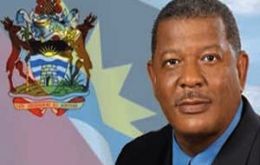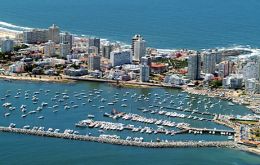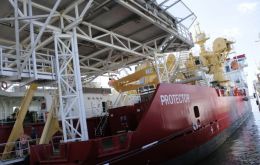MercoPress. South Atlantic News Agency
Tag: Falklands flags
-
Friday, February 10th 2012 - 01:08 UTC
Antigua and Barbuda deny supporting bar on Falklands flagged vessels

The government of Antigua and Barbuda by way of a press statement issued Wednesday, disassociated the Caribbean nation from statements made in the wake of the recent Eleventh ALBA summit, which were carried in the local, regional and international press, about a ban on Falkland Islands-flagged ships.
-
Monday, February 6th 2012 - 07:03 UTC
Caribbean states join Mercosur in barring Falklands’ flagged vessels from their ports

Several Caribbean states and Nicaragua announced this weakened they will bar from their ports any vessel flying the Malvinas flag, according to a release from the Argentine Ministry of Foreign Affairs.
-
Wednesday, February 1st 2012 - 07:14 UTC
Brazil reiterates support for Argentina, denies any blockade to the Falklands

Brazil reiterated its support for Argentina’s Malvinas Islands sovereignty claim and insisted that solving the controversy with the UK is ‘most important’ for South America’s stability. It also pointed out that it’s not correct to talk about “a blockade”.
-
Monday, January 16th 2012 - 07:18 UTC
Chile prepares for “crossed pressures” on the Falklands’ conflict 30th anniversary

The Chilean Foreign Affairs ministry has been very busy doing a complete review of norms and of maritime traffic and international trade agreements in the event of what are considered growing pressures from Argentina to establish a sort of “regional blockade” against the Malvinas Islands, a UK Overseas Territory.
-
Thursday, January 5th 2012 - 01:18 UTC
Spanish vessel with Falklands’ flag barred from the port of Punta del Este

A Spanish fishing vessel flying the Falkland Islands flag was barred from entering the alternative port of Punta del Este where she was planning to receive crewmembers. The news was confirmed by Uruguay’s Coast Guard.
-
Wednesday, January 4th 2012 - 05:31 UTC
HMS Protector ‘complies with all requirements’ to operate from Montevideo

Uruguay authorized the Royal Navy Ice Patrol HMS Protector into Montevideo because it complies with normal procedure in spite of the fact that its next port of call is Stanley in Falklands/Malvinas.
-
Friday, December 30th 2011 - 06:36 UTC
Uruguay suggests changing to the red ensign for Falklands’ vessels to operate in Montevideo

No changes are needed in current legislation to bar vessels flying the Malvinas flag from entering Uruguayan ports, but Uruguay also speculates that if the vessels change to the English flag there will be no problems, according to a report from the Foreign Affairs ministry.
-
Thursday, December 29th 2011 - 21:24 UTC
Falklands’ flagged vessels: “Another diplomatic victory for President Fernández”

In its latest article on Argentina The Economist refers to the recent Mercosur decision to support President Cristina Fernandez in barring vessels flying the Falklands’ flag from docking in regional ports.
The magazine as the heading says (Argentina and the Falklands: rocking the boat) describes it as another diplomatic victory for Cristina and also argues that both the Falkland Islands and Britain have failed to explain their case to the rest of South America.
